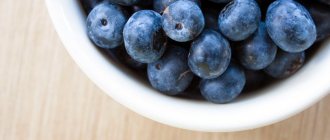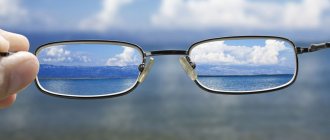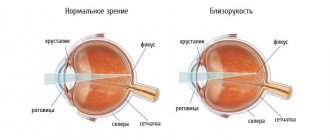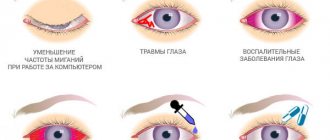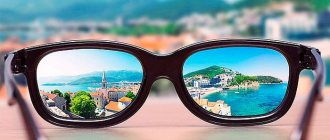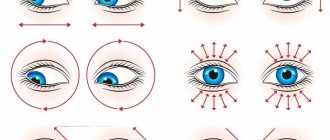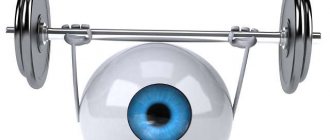Carrots and blueberries - these two products are known to all bespectacled people. People with poor eyesight simply must include them in their diet - this is what ophthalmologists say. But is it possible to improve or at least maintain eye vigilance through diet? And here the doctors are unanimous. A balanced diet rich in essential vitamins supports the body's immune strength. In turn, strong immunity prevents the progression of eye diseases. We will tell you how to eat properly if you are myopic in our article.
Healthy foods
The main recommendation for a diet for myopia is to contain sufficient amounts of protein in foods. This group includes meat, fish and eggs. In this case, you should limit your consumption of animal fats. Therefore, preference should be given to dietary products: beef, rabbit, poultry, seafood. It is better to steam them, bake them in the oven or stew them. Other foods that are considered “protective” foods include:
- Coarse bread. Skip the sweet buns in favor of whole grain or bran baked goods.
- Vegetarian soups. You can use light fish or chicken broth as a base.
- Vegetables. Load up on vitamin D, found in nature's yellow bounty. In addition to carrots and bell peppers, spinach, parsley and green onions will also benefit your eyesight. Don't forget about seaweed.
- Oat and buckwheat groats. These porridges are best suited as a side dish, but you need to be careful with pasta. You can treat yourself to spaghetti made from durum wheat no more than once a week.
- Dried fruits. Dried apricots, raisins and prunes will be excellent substitutes for unhealthy sweets and chocolate.
- Dairy products. Kefir and natural yogurt help the intestines work, strengthening the body's protective resources.
For drinks, doctors recommend green tea and freshly squeezed juices. The diet can be diluted with decoctions of rose hips and hawthorn, fruit drinks from cranberries and currants.
Eating good for your eyes
Finally, it's time to list the 10 most beneficial foods for the eyes.
- Carrots are rich in a large number of vitamins, and primarily vitamin A, which is essential for the eyes. Thanks to the presence of beta-carotene, carrots help maintain visual acuity. If you want to enhance the effect, make a carrot salad with sour cream or stew it with the addition of cream. This method of preparation improves the absorption of fat-soluble carotene.
- Blueberries, thanks to vitamins B1 and C, as well as the pigment lutein, help maintain visual acuity and reduce eye fatigue. It must be said that blueberries retain their properties even when frozen, and even if you make jam from them.
- Black chocolate. This product protects the blood vessels of the eyes thanks to the flavonoids it contains, which strengthen the cornea. But be careful: we are talking about dark chocolate without additives or impurities.
- Spinach is one of those vegetables that are rich in cataract-fighting lutein. Therefore, by introducing it into your diet, you can reduce the risk of eye disease by up to 10%.
- Cottage cheese contains vitamin B2, or riboflafin, which stimulates and supports metabolism in the cornea and lens, and vitamin B12, or cyanocobalamin, improves blood supply to the eyes and has a supporting effect.
- Pumpkin. In addition to the fact that pumpkin contains lutein and zeaxanthin, it is rich in vitamins C, A, B1, B2 and zinc, which retain their properties even during heat treatment. Significantly increases the likelihood that everyone will find a dish with pumpkin that is beneficial for eye health, the fact that you can make salads, soups, cereals, and even desserts from pumpkin.
- Broccoli. Another product that supports vision thanks to the content of lutein and zeaxanthin, which are important for the proper functioning of the lens, as well as carotene, which helps protect eye cells from free radicals.
- Fish and fish oil. These are sources of omega-3 fatty acids necessary for good vision. Salmon is richest in them, but sardines, herring, and mackerel are no less useful. Consuming fish oil will prevent macular degeneration.
- Onion and garlic. By adding these products to various dishes, you will help your vision maintain or restore clarity, because they are rich in the substance responsible for this - sulfur.
- Fruits. We conclude the list of the 10 most beneficial foods for the eyes with an extensive group that supports our entire body, including a positive effect on eye health. Kiwi, grapes, oranges, peaches, papaya... Green and orange fruits are especially good for the eyes.
Prohibited
The category of harmful products includes:
- sugar (better replaced with stevia);
- smoked meats and sausages;
- homemade pickles;
- spicy and salty dishes;
- strong black tea, cocoa, coffee;
- carbonated drinks;
- alcohol;
- fast food.
It is better not to abuse dishes from the “dangerous” list. If you absolutely cannot do without crispy pickles or a cup of aromatic coffee, try to gradually reduce their consumption. Arrange “reverse fasting days” for yourself - once a month you can treat yourself. Of course, following a diet is not a panacea for myopia. In addition to dietary restrictions, you must regularly visit your doctor and follow his recommendations. A healthy lifestyle is a good help for our body in general and our eyes in particular.
Do you need a diet?
Ophthalmologists recommend including in your diet a lot of proteins of plant and animal origin, vitamins C, A and B. It is necessary to consume more foods containing microelements such as zinc, magnesium, selenium. This will improve the circulation of intraocular fluid and strengthen the visual muscles. Useful components are presented in the table:
| Vitamins | Action | Products |
| A | Part of the retina of the eye | Carrot |
| bell pepper | ||
| Lettuce leaves | ||
| Stimulates cell growth and reproduction | Hard cheese | |
| Restores vision | Pumpkin | |
| Takes part in protein synthesis | Chicken liver | |
| B2 | Improves vision sharpness | Cod liver |
| Tuna | ||
| Spinach | ||
| Cauliflower | ||
| Helps in adaptation of eyes in the dark | Dill | |
| Peas | ||
| Corrects color perception | Chicken eggs | |
| C | Helps strengthen eye capillaries | Radish |
| Broccoli | ||
| Parsley leaves | ||
| Dill | ||
| Prevents bleeding under the mucous membrane of the eyeballs | Rose hip | |
| Citrus | ||
| Stops the clouding process | Black currant | |
| Strawberry |
In addition, the diet includes the following microelements from the table:
| Microelements | Action | Products |
| Zinc | Reduces retinal damage | Beef liver |
| Oysters | ||
| Pumpkin seeds | ||
| Prevents macular degeneration | Sesame | |
| Nuts | ||
| Black chocolate | ||
| Selenium | Protects the lens of the eye | Sea kale |
| Squid | ||
| Liver | ||
| Kidneys | ||
| Prevents the development of cataracts | Oatmeal | |
| Corn | ||
| Olives | ||
| Chromium | Promotes the penetration of glucose through the inner membranes of cells | Black bread |
| Jacket potatoes | ||
| Beef liver | ||
| Increases vision sharpness | Walnuts | |
| Peanut butter | ||
| Magnesium | Improves vision | Apples |
| Almond | ||
| Melon | ||
| Grapefruit | ||
| Ginger | ||
| Protects eyes from deformation | Bananas | |
| Green tea | ||
| Is a powerful antioxidant | Sorrel | |
| Sesame |
How to improve vision: a complex of vitamins and minerals
Before introducing Start-health subscribers to a list of healthy foods, it is important to determine the structural composition of food that has a positive effect on the senses. In order for food consumption to be accompanied by a therapeutic effect, you need to pay attention to the high concentration of the following minerals and trace elements in the diet:
- Vitamin “A” - such formations contain a large number of retinoids and carotenoids involved in the creation of the visual signal (found in yolks, butter, fish liver, cheeses).
- Potassium is an alkaline metal contained in the structure of cells (present in honey, melon, greens, raisins).
- Vitamin “C” - the composition of organic compounds ensures the maintenance of normal carbohydrate and salt balance, as well as the creation of favorable conditions for the permeability of the eye capillaries (carrots, potatoes, tomatoes, red peppers, cabbage).
- Carotene is a yellow-orange pigmentation that promotes the production of vitamin A in the body (found in carrots, sea buckthorn, apricots, rowan).
- Vitamins “B1”, “B2”, “B6”, “B12” – a high concentration of thiamine, riboflavin and cobalamin, which ensure the full functioning of the senses (found in fermented milk products, vegetables and fruits).
Guys, the above microelements and mineral formations are present in various products, so you can independently compose your diet, taking into account personal preferences.
Useful information: “It has been scientifically proven that modern tablets and medications designed to improve vision are absorbed by the body much worse than natural vitamins and minerals contained in food.”
Eye diet for myopia - will it help or not?
For myopia, the doctor may recommend, along with other methods of treatment and correction, changing your diet, enriching it with vitamins and other substances that are beneficial for vision. Also, an eye diet for myopia involves excluding from your diet those foods that can contribute to vision deterioration.
But it should be understood that it is impossible to cure a refractive error with diet. Adjusting nutrition towards a healthier, fortified, balanced diet, rather, serves to prevent the progression of the disease. Thus, regular consumption of foods that are healthy for vision can strengthen the immune system, improve the nutrition of eye tissue, and help strengthen the blood vessels of the eyes.
However, it is unlikely that it will be possible to correct existing visual impairments with diet. For this purpose, your doctor may prescribe glasses or contact lenses (for example, ACUVUE Oasys, Avaira, Biotrue).
The use of optical correction, diet, as well as eye exercises, compliance with visual load standards, a healthy lifestyle - all this, with an integrated approach, can give excellent results in the prevention and treatment of myopia at different stages.
What leads to the development of myopia?
Myopia is considered one of the most common visual disorders. Already today, the number of myopic people in the world is approaching two billion, and by 2021, according to experts, this number will increase to 2.5 billion.
The main symptom of this pathology is deterioration of distance vision.
Myopic people see well up close, but when viewing distant objects they have to squint to focus their gaze.
The main causes of myopia are considered to be the incorrect shape of the eyeball, which causes light to focus in front of the retina, and excessive refraction of rays by the optics of the eye.
There are several factors that increase the risk of developing myopia:
- Heredity - those people who have both parents who were nearsighted are at greatest risk.
- Weakening of the scleral tissue—this can cause the eyeball to stretch and visual focus to shift.
- Lack of accommodation may contribute to a compensatory change in the size of the eyeball.
- Exhausted body - reduced immunity, allergies, infectious diseases, brain injuries, etc.
- Excessive or incorrect visual load - long hours at the computer, poor lighting, incorrect position when reading.
What foods should you eat to improve your vision?
Hi everybody!
Today I want to raise an important problem of our time, because of which many people are forced to feel constant discomfort and feel inferior. A sharp decline in vision caused by regular spending time at the computer is becoming a real “plague” of the 21st century.
Social networks, television, entertainment programs - the reasons for visiting the Internet can be different. However, there is only one result - buying glasses or purchasing lenses.
I suggest preventing the occurrence of eye diseases by promptly changing your diet.
By regularly consuming foods to improve vision, as well as by refusing junk food, we can prevent the occurrence of cataracts and night blindness, restore the full functioning of the sensory organs and strengthen the muscle tissue of the cornea.

